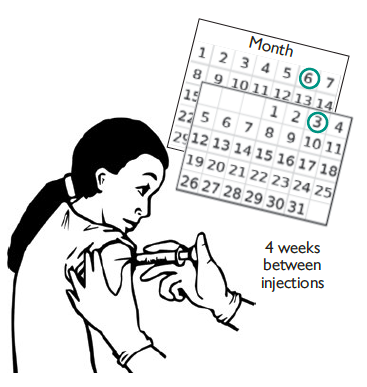Chapter 5
Supporting New and Continuing Users
| Give specific instructions |
|
|
How Can a Partner Help? |
|---|
|
The client’s partner is welcome to participate in counseling and learn about the method and what support he can give to his partner. A male partner can:
|
“Come Back Any Time”: Reasons to Return Before the Next Injection
Assure every client that she is welcome to come back any time—for example, if she has problems, questions, or wants another method; she has a major change in health status; or she thinks she might be pregnant.
General health advice: Anyone who suddenly feels that something is seriously wrong with her health should immediately seek medical care from a nurse or doctor. Her contraceptive method is most likely not the cause of the condition, but she should tell the nurse or doctor what method she is using.
Planning the Next Injection
- Agree on a date for her next injection in 4 weeks.
- Ask her to try to come on time. She may come up to 7 days before the scheduled date or 7 days late and still get an injection.
- She should come back no matter how late she is for her next injection. If more than 7 days late, she should abstain from sex or use condoms, spermicides, or withdrawal until she can get an injection. She can also consider emergency contraceptive pills if she is more than 7 days late and she has had unprotected sex in the past 5 days (see Chapter 3 – Emergency Contraceptive Pills).
Repeat Injection Visits
- Ask how the client is doing with the method and whether she is satisfied. Ask if she has any questions or anything to discuss.
- Ask especially if she is concerned about bleeding changes. Give her any information or help that she needs (see Managing Any Problems).
- Give her the injection. Injection can be given up to 7 days early or late.
- Plan for her next injection. Agree on a date for her next injection (in 4 weeks). Remind her that she should try to come on time, but she should come back no matter how late she is. She may still be able to have her injection.
- Every year or so, check her blood pressure if possible (see Medical Eligibility Criteria, Question 5).
- Ask a long-term client if she has had any new health problems. Address problems as appropriate. See New Problems That May Require Switching Methods.
- Ask a long-term client about major life changes that may affect her needs—particularly plans for having children and STI/HIV risk. Follow up as needed.
Managing Late Injections
- If the client is less than 7 days late for a repeat injection, she can receive her next injection. No need for tests, evaluation, or a backup method.
- A client who is more than 7 days late can receive her next injection if:
- She has not had sex since 7 days after the scheduled date of her injection, or
- She has used a backup method or has taken emergency contraceptive pills (ECPs) after any unprotected sex since 7 days after the scheduled date of her injection.
- She will need a backup method for the first 7 days after the injection
- If the client is more than 7 days late and does not meet these criteria, additional steps can be taken to be reasonably certain she is not pregnant (see the job aid Ruling Out Pregnancy).
- Discuss why the client was late and solutions. If coming back on time is often a problem, discuss using a backup method when she is late for her next injection, taking ECPs, or choosing another method.